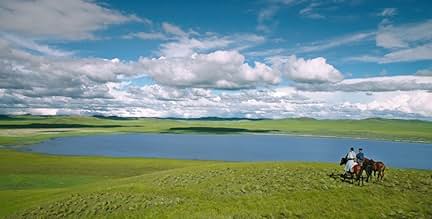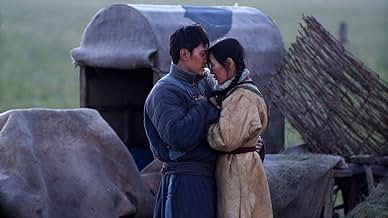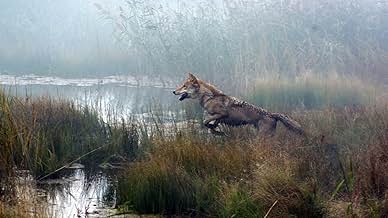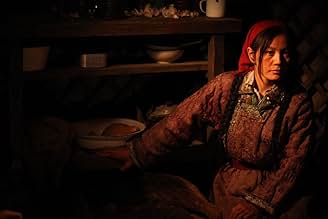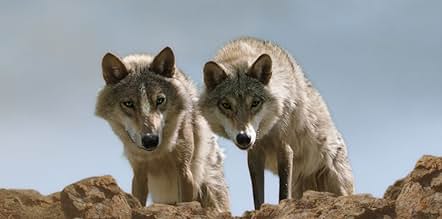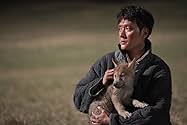CALIFICACIÓN DE IMDb
6.6/10
6.4 k
TU CALIFICACIÓN
Durante la Revolución Cultural China, un joven estudiante de ciudad se va a vivir con unos pastores mongoles, donde adopta un cachorro de lobo.Durante la Revolución Cultural China, un joven estudiante de ciudad se va a vivir con unos pastores mongoles, donde adopta un cachorro de lobo.Durante la Revolución Cultural China, un joven estudiante de ciudad se va a vivir con unos pastores mongoles, donde adopta un cachorro de lobo.
- Dirección
- Guionistas
- Elenco
- Premios
- 20 premios ganados y 16 nominaciones en total
Ankhnyam Ragchaa
- Gasma
- (as Ankhnyam Rachaa)
Baasanjav Mijid
- Bilig
- (as Basen Zhabu)
Gexige Baoyin
- Batu
- (as Baoyingexige)
Opiniones destacadas
-Wolf Totem (2015) movie review: -Wolf Totem is a Chinese film, made by the French director of Troy, based on the novel (based on a true story) following two Chinese students staying in a modern (1960s) nomadic group of Mongols who raise horses and sheep. They live in a somewhat dangerous area inhabited by Mongolian wolves, so when a corporate residential manager decides to essentially steal food from the smartest species of wolf on the planet, the wolves are forces to get into a turf was with the Mongolian shepherds. It is like the set-up for The Last Samurai if the samurai were the wolves.
-This ambitious endeavor paid off with a massive visual appeal, fantastic production value, and an incredibly emotional story. It was quite a great film.
-I'll go ahead and say this, if you don't like animal deaths or tragedy that might come with said true events surrounding the decline of two impressive races, Mongolians and Mongolian wolves, you will not enjoy this film. However, the story is well told and filled with smart writing to drive the point home and beyond. You will get more that you bargained for.
-The film takes a short while to really pick up, but it has a good pace for most of the film.
-The acting is very good. I do not know any of the actors or wolf actors in it, but the actors did a compelling job and the wolves were so much better than just having stock footage of wolves.
-The characters offered a lot to the story. Each character represents a human trait in a way. The main character, Chen Zhen, offers the hope in humanity and the attempt to see the best during dire situations. His best friend character is more of the ambitions, progressive look at those people who just don't care. There is the village leader, who represents the old ways and greatness of tradition. And of course, the sorta-villain who represents everything wrong with change and industrialization.
-The music is the best thing about it. James Horner composes one of his best, most beautiful, and most heart-string-pulling scores. It was actually how I found this film in the first place.
-Again, the design on the film is visually stunning. Very good practical effects, cinematography, and impressively good wolf training. Fun fact: This project was turned down by every major Chinese director because they thought it too difficult to train Mongolian wolves.
-It is an emotionally draining film and the true story makes it even harder to enjoy, but it is truly a compelling, well made, beautiful film that I think is totally worth checking out! -Wolf Totem does not have a rating, but it has a PG-13 amount of violence and language, so I would say PG-13. Makes sense.
-This ambitious endeavor paid off with a massive visual appeal, fantastic production value, and an incredibly emotional story. It was quite a great film.
-I'll go ahead and say this, if you don't like animal deaths or tragedy that might come with said true events surrounding the decline of two impressive races, Mongolians and Mongolian wolves, you will not enjoy this film. However, the story is well told and filled with smart writing to drive the point home and beyond. You will get more that you bargained for.
-The film takes a short while to really pick up, but it has a good pace for most of the film.
-The acting is very good. I do not know any of the actors or wolf actors in it, but the actors did a compelling job and the wolves were so much better than just having stock footage of wolves.
-The characters offered a lot to the story. Each character represents a human trait in a way. The main character, Chen Zhen, offers the hope in humanity and the attempt to see the best during dire situations. His best friend character is more of the ambitions, progressive look at those people who just don't care. There is the village leader, who represents the old ways and greatness of tradition. And of course, the sorta-villain who represents everything wrong with change and industrialization.
-The music is the best thing about it. James Horner composes one of his best, most beautiful, and most heart-string-pulling scores. It was actually how I found this film in the first place.
-Again, the design on the film is visually stunning. Very good practical effects, cinematography, and impressively good wolf training. Fun fact: This project was turned down by every major Chinese director because they thought it too difficult to train Mongolian wolves.
-It is an emotionally draining film and the true story makes it even harder to enjoy, but it is truly a compelling, well made, beautiful film that I think is totally worth checking out! -Wolf Totem does not have a rating, but it has a PG-13 amount of violence and language, so I would say PG-13. Makes sense.
This movie is based on a semi-autobiographical novel and I think they did a pretty good job in turning a literary piece of art into a cinematic experience. This is one of the reasons I gave this movie 7 stars. Other reasons included great performances (extremely natural and believable), beautiful scenery and the amount of empathy the creatures from this movie were able to develop in me from beginning to end. Of course, all of the creatures except...humans. Ok, you can try to understand them, but if you are a sensitive person you can't help but hate every single character here except the Chinese student who adopted the little wolf. The main character is the only character with a sensitive heart and a pure soul. Yes, there is a little kid from the village, I'm sorry. I studied Chinese language and literature and I spent some time in China while I was a college student, I think this is is a very accurate portrayal of Chinese people, no matter if we are talking about people from big cities or countryside. Unfortunately, it is very difficult to find a highly sensitive Chinese person. They can be wise and smart, but they are practical and cruel. And I couldn't enjoy the movie. Being a huge animal lover, my heart was shaking all of the time. The scenes are highly graphic, brutal and disturbing. I agree that these types of movies are necessary for us to raise our awareness about many things that happen between men and animals and to try to change and improve the relationship somehow. I liked the ending scene because in a certain way it blended sensitivity with "coldness", wild warrior spirit of the wolf was compared with still naive and culturally embedded spirit of the young Chinese student and they did that in a strong and emotional way. (I am not a native English speaker, so please don't laugh if something sounds strange in this review ;) ). All in all, I think that people who really love animals will have a really hard time while watching this movie.
I know the name of Jean-Jacques Annaud from The Bear, a movie that made his name a lot more memorable to me than The Name of the Rose, another movie I loved and that he directed. In The Bear, the main character was a little bear cub and any humans in the film were mere secondary characters. The things that film did with animals was nothing short of miraculous.
In this Chinese-French coproduction, there are a lot of wolves and talk about wolves and people getting angry about wolves or loving them, but they are not the main characters. Relegated to the subject of a conversation, wolves play a minor part in this film that doesn't seem to know what it wants to be. It shows a little bit of Chinese Cultural Revolution, but not enough to be of any relevance or warrant the wrath of Chinese authorities. It shows the free way of the Mongols living in the steppes, but it doesn't go in depth. It shows some beautiful wolves, but most of the time they just look pretty and don't do much. It shows men in love with women, but it never goes into romance territory. It shows city boys being schooled in the ways of the steppe, but it doesn't really make anything of it.
The acting was good and so was the direction, I guess. The wide views of the green steppe were beautiful (until the mosquitoes arrived). Yet most of the time is seemed like a fairy tale, lacking a truth that I am not aware of, but that felt like it should be different.
It is not that I didn't like the film, but after two hours of going back and forth between genres, alternating between hating the Communist director who doesn't understand the life of the land and hating just about everybody else for their pretentious stupidity, I was actually bored.
In this Chinese-French coproduction, there are a lot of wolves and talk about wolves and people getting angry about wolves or loving them, but they are not the main characters. Relegated to the subject of a conversation, wolves play a minor part in this film that doesn't seem to know what it wants to be. It shows a little bit of Chinese Cultural Revolution, but not enough to be of any relevance or warrant the wrath of Chinese authorities. It shows the free way of the Mongols living in the steppes, but it doesn't go in depth. It shows some beautiful wolves, but most of the time they just look pretty and don't do much. It shows men in love with women, but it never goes into romance territory. It shows city boys being schooled in the ways of the steppe, but it doesn't really make anything of it.
The acting was good and so was the direction, I guess. The wide views of the green steppe were beautiful (until the mosquitoes arrived). Yet most of the time is seemed like a fairy tale, lacking a truth that I am not aware of, but that felt like it should be different.
It is not that I didn't like the film, but after two hours of going back and forth between genres, alternating between hating the Communist director who doesn't understand the life of the land and hating just about everybody else for their pretentious stupidity, I was actually bored.
Based on a novel written by Jiang Rong, the story takes place in Mongolia, with sublime landscapes of the Eurasian steppes and describes the daily life of the natives. One of them will adopt a wolf-cub while the wild wolves regularly ravage either the flocks of sheep or the herds of horses.
It is excellently filmed and the film is similar to a naive and contemplative tale for children.
It is excellently filmed and the film is similar to a naive and contemplative tale for children.
This film, in general, is not bad, but the original novel's author is obviously strongly influenced by the Chinese Communism. He glorified the heartless Culture Revolution in last century, and never touched the sensitive taboos of those absolute-NO-NOs indoctrinated by the reigning Chinese Party. What we got in this film is a wonderful Inner Mongolian prairies life. Two displaced young Mandarin men were forced to leave their hometown and exiled to the far and remote Inner Mongolia province, trying to survive for the stipulated 2 years expatriation.
The production team of this movie had hired some specialists to train a bunch of wolves to play the main and critical roles of this film. I have also read some of the scandals related to the rehabilitation of those wolves after the film was completed. what I found the most pretentious flaw in this film is the female actors to play the Mongolian tribal women (like the females in "Spare Parts 2015). They are extremely eye-appealing and cosmetically pretty, yet the truth about the Mongolian females(like the females in "Spare Parts 2015), most of them are not as pretty as what the movie showed us. The other unrealistic part of the film is the kind faces and the gentle way of talk from the local Chinese Communist Party officials. They looked too civilized and too reasonably kind when treating the Mongolian nomad tribes.
The good part of this film is the camera work, the cinematography, it did an amazing job to show us the beauty of the Mongolian wildness, through the lens, it pretentiously beautified the tough livelihood of the local tribes, showed us the wonderful free spirit of those people. But in truth, is it true that the Chinese Communist Party would be that kind? When I watched this film, I have to remind myself that this film was not a documentary film, I had to watch carefully for those phony and false parts of it.
When the Chinese Communist Party censors every book, every movie, every TV program, every blog on line, many real things would be carefully omitted and avoided, otherwise, nothing could be released or past the censorship. So it also means that anything that have been approved must not demonize the Party but praise, otherwise jail time and long term imprisonment would be implemented.
So don't be fooled by this already heavily cosmetically beautified film, by its beautiful cinematography achievement, by those absolutely unreal Mongolian young beauties.
The production team of this movie had hired some specialists to train a bunch of wolves to play the main and critical roles of this film. I have also read some of the scandals related to the rehabilitation of those wolves after the film was completed. what I found the most pretentious flaw in this film is the female actors to play the Mongolian tribal women (like the females in "Spare Parts 2015). They are extremely eye-appealing and cosmetically pretty, yet the truth about the Mongolian females(like the females in "Spare Parts 2015), most of them are not as pretty as what the movie showed us. The other unrealistic part of the film is the kind faces and the gentle way of talk from the local Chinese Communist Party officials. They looked too civilized and too reasonably kind when treating the Mongolian nomad tribes.
The good part of this film is the camera work, the cinematography, it did an amazing job to show us the beauty of the Mongolian wildness, through the lens, it pretentiously beautified the tough livelihood of the local tribes, showed us the wonderful free spirit of those people. But in truth, is it true that the Chinese Communist Party would be that kind? When I watched this film, I have to remind myself that this film was not a documentary film, I had to watch carefully for those phony and false parts of it.
When the Chinese Communist Party censors every book, every movie, every TV program, every blog on line, many real things would be carefully omitted and avoided, otherwise, nothing could be released or past the censorship. So it also means that anything that have been approved must not demonize the Party but praise, otherwise jail time and long term imprisonment would be implemented.
So don't be fooled by this already heavily cosmetically beautified film, by its beautiful cinematography achievement, by those absolutely unreal Mongolian young beauties.
¿Sabías que…?
- ConexionesReferenced in At the Movies: Cannes Film Festival 2013 (2013)
Selecciones populares
Inicia sesión para calificar y agrega a la lista de videos para obtener recomendaciones personalizadas
- How long is Wolf Totem?Con tecnología de Alexa
Detalles
- Fecha de lanzamiento
- Países de origen
- Sitio oficial
- Idiomas
- También se conoce como
- Wolf Totem
- Locaciones de filmación
- Xilingol Grassland, Inner Mongolia, China(major location)
- Productoras
- Ver más créditos de la compañía en IMDbPro
Taquilla
- Presupuesto
- USD 38,000,000 (estimado)
- Total en EE. UU. y Canadá
- USD 210,591
- Total a nivel mundial
- USD 125,837,070
- Tiempo de ejecución2 horas 1 minuto
- Color
- Mezcla de sonido
- Relación de aspecto
- 2.35 : 1
Contribuir a esta página
Sugiere una edición o agrega el contenido que falta

Principales brechas de datos
What is the Brazilian Portuguese language plot outline for Le dernier loup (2015)?
Responda






